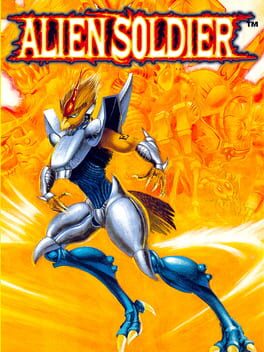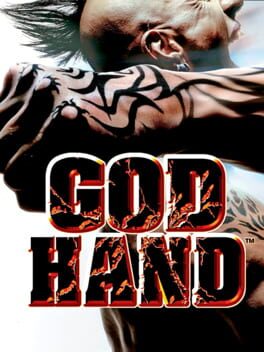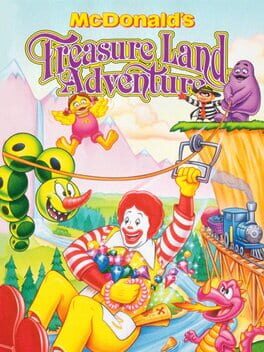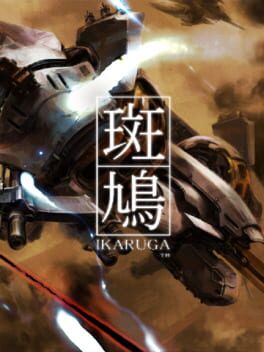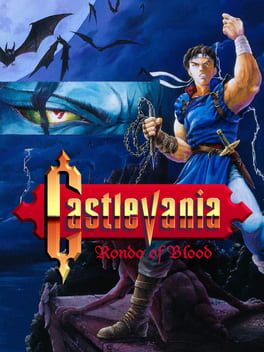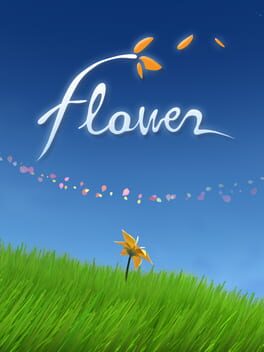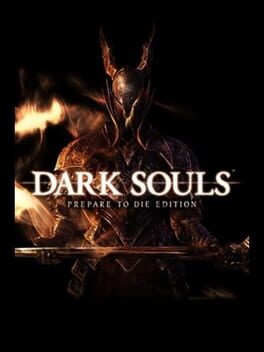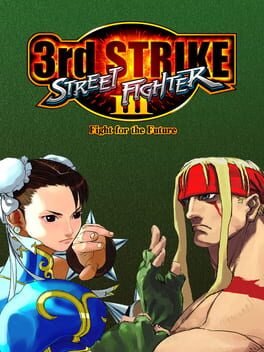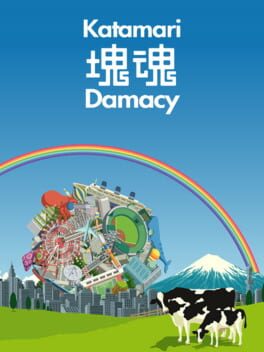LukeGirard
BACKER
358 Reviews liked by LukeGirard
Alien Soldier
1995
God Hand
2006
Ikaruga
2001
Ever since I played Treasure's Alien Soldier and fell in love with it, I decided to start looking around in Treasure's other games. I have played Wario World (I think it's okay) and I have Gunstar Heroes and Sin and Punishment on my backlog, but the one game that is always talked about is this one: Ikaruga.
Treasure themselves are very strange developers, as the games they make are for the most die hard of action games fans. AKA: Insane people, like myself. Their library mostly consists of renowned cult classic action games or anime game shovelware. Looking deep into their company philosophy though, they have said time and time again that they take these shovelware commissions to raise funds to make the games they want to make, and for their fans, never worrying about how well they actually sell, which is one of the reasons why they created Ikaruga.
Ikaruga is probably Treasure at their most focused on what they make best: good arcade centered action games. Designed as a sort of spiritual successor to Radiant Silvergun, another one of Treasure's original games, Ikaruga on the surface seems like just a typical bullet hell spaceship shooter. Now I've tried my fair share of them before such as Touhou, but I could never really properly get myself into them. They're designed to be overwhelming as you navigate yourself around a seemingly maddening series of one hit kill bullets with your deceptively small hurtbox as you fire away at a boss fight till it goes away. They have their audience no doubt, but mastering them has always seemed like such a steeper challenge as it involves a lot more reflex mastery and memorization from the player to get the most enjoyment out of them and yes at times that can feel exhausting. Ikaruga is still like those games but what makes it stand out from those other bullet hell games is the Polarity System.
The premise is simple: by pressing the B or O button, your ship will change from White to Black and vice versa. What this means is not also you do double the damage to ships of that same color, but you also absorb bullets of that same color. Yes, you read that right, you absorb bullets in a bullet hell game, and the bullets you absorb fills up a meter on the side which allows you to launch powerful shots to clear the screen. You think that would trivialize a lot of the challenge here, but that's where the other color comes in, as you have to make sure you avoid the opposite color or else your spaceship will explode. And the game will test you on this gimmick constantly, as not also patterns will constantly mix up on bullet colors, but on the hardest difficulty enemies will shoot an array of bullets of their color upon death.
The lead designers of this game has often described Ikaruga to be approached as a puzzle game that just so happens to have shooting mechanics baked into it because of the Polarity System. While you can think that statement is a bit too general, it's an interesting way to describe the utility of the Polarity System because it doesn't make the game revolve around just maneuvering around the bullets while pumping the enemies full of your own, but it also gives the game a sense of strategy. Every encounter you ask yourself where the enemy is, what are they doing, what are they firing, what form should you be in and when should you be dodging bullets or switching colors, taking a very simple mechanic and giving it layers of depth and nuance.
Breaking the game down like this probably made the game sound easier than it actually is. No, far from it. Ikaruga is the hardest game I've ever played and it's not even close. Yet I'm not swayed from it because at it's core, Ikaruga is not your average spaceship shooter. It's challenging, relentless and frantic but also wildly addicting and mesmerizing, backed by a kickass soundtrack which seems to be a Treasure Games staple.
So, as a recommendation, try this one out, even if you aren't particularly into bullet hells. Switch the game into Free Play mode and do a couple of playthroughs on that. Then, as you get a feel for the game, take those training wheels off and let yourself be caught in the wonderful puzzle-like flow of Ikaruga.
Also check out Alien Soldier that game is fantastic like oh my god words cannot describe how-
Treasure themselves are very strange developers, as the games they make are for the most die hard of action games fans. AKA: Insane people, like myself. Their library mostly consists of renowned cult classic action games or anime game shovelware. Looking deep into their company philosophy though, they have said time and time again that they take these shovelware commissions to raise funds to make the games they want to make, and for their fans, never worrying about how well they actually sell, which is one of the reasons why they created Ikaruga.
Ikaruga is probably Treasure at their most focused on what they make best: good arcade centered action games. Designed as a sort of spiritual successor to Radiant Silvergun, another one of Treasure's original games, Ikaruga on the surface seems like just a typical bullet hell spaceship shooter. Now I've tried my fair share of them before such as Touhou, but I could never really properly get myself into them. They're designed to be overwhelming as you navigate yourself around a seemingly maddening series of one hit kill bullets with your deceptively small hurtbox as you fire away at a boss fight till it goes away. They have their audience no doubt, but mastering them has always seemed like such a steeper challenge as it involves a lot more reflex mastery and memorization from the player to get the most enjoyment out of them and yes at times that can feel exhausting. Ikaruga is still like those games but what makes it stand out from those other bullet hell games is the Polarity System.
The premise is simple: by pressing the B or O button, your ship will change from White to Black and vice versa. What this means is not also you do double the damage to ships of that same color, but you also absorb bullets of that same color. Yes, you read that right, you absorb bullets in a bullet hell game, and the bullets you absorb fills up a meter on the side which allows you to launch powerful shots to clear the screen. You think that would trivialize a lot of the challenge here, but that's where the other color comes in, as you have to make sure you avoid the opposite color or else your spaceship will explode. And the game will test you on this gimmick constantly, as not also patterns will constantly mix up on bullet colors, but on the hardest difficulty enemies will shoot an array of bullets of their color upon death.
The lead designers of this game has often described Ikaruga to be approached as a puzzle game that just so happens to have shooting mechanics baked into it because of the Polarity System. While you can think that statement is a bit too general, it's an interesting way to describe the utility of the Polarity System because it doesn't make the game revolve around just maneuvering around the bullets while pumping the enemies full of your own, but it also gives the game a sense of strategy. Every encounter you ask yourself where the enemy is, what are they doing, what are they firing, what form should you be in and when should you be dodging bullets or switching colors, taking a very simple mechanic and giving it layers of depth and nuance.
Breaking the game down like this probably made the game sound easier than it actually is. No, far from it. Ikaruga is the hardest game I've ever played and it's not even close. Yet I'm not swayed from it because at it's core, Ikaruga is not your average spaceship shooter. It's challenging, relentless and frantic but also wildly addicting and mesmerizing, backed by a kickass soundtrack which seems to be a Treasure Games staple.
So, as a recommendation, try this one out, even if you aren't particularly into bullet hells. Switch the game into Free Play mode and do a couple of playthroughs on that. Then, as you get a feel for the game, take those training wheels off and let yourself be caught in the wonderful puzzle-like flow of Ikaruga.
Also check out Alien Soldier that game is fantastic like oh my god words cannot describe how-
The best castlevania game of all time in my opinion and one of my favourite game of all times too. Everything that makes castlevania so fantastic is here in full force and its been improved to absolute peak perfection. The non-linear paths of castlevania 3 are back and are implemented even better here, resulting in a game that doesn't rely anymore on NES tricks to kill you, but rather carefully placed enemies and obstacles to let you use your whip on. The controls are back to their NES days, though they've been tweaked enough that it feels better to control than those games and it improves the experience as a result. And that soundtrack, oh my fucking god that soundtrack. Best castlevania soundtrack of the franchise. With the difficulty being just the right amount of hard and the iconic Richter Belmont and Maria Renard being introduced here, Rondo Of Blood is like a great melody that will be stuck in my head for years to come.
Flower
2009
Alien Soldier
1995
(Note: If you plan on playing this game, pick up the Japanese version. It runs notably better than the PAL version Sega put up on Steam. You can switch regions from the Genesis collection once you put the JP Rom in the game's files.)
From the outside of it, Alien Soldier seems such a tacky and generic name for another Run N' Gun in the Genesis library, a game library that's just swarming with arcade-like shooters. When I booted the game, I was immediately greeted to an onslaught of text explaining this nonsensical plot to me for about 5 minutes. Then once I made it to the title screen and had a look into the options settings, I was given the choice to play the game on both "SUPEREASY" and "SUPERHARD". This has only foreshadowed what I was getting myself into.
Once I hit start, I had the option to select 6 different weapons which the game nicely showed me what they did before I put them in my four weapon slots then the game asked me how I'd like to display my characters info, how much ammo he had, and the enemies health, for which the game had 23 different options for, all can be toggled as meters, exact numbers, or to keep them hidden entirely. Action games to this day don't even have that much customization for displaying vital information. Then the game gave me a little warm-up room to show me the controls. You have a shoot, a switch that allows you to switch firing from in-place to freely move shooting, a parry, a weapon wheel, a full screen dash, and a jump. All of these only mapped to three Sega Genesis buttons.
I then actually got to play the game and the first run of it was rather loud. And I don't mean the music, I mean it was loud in every human sense possible. The game shoots you in immediately on the word go and you shoot everything at a million miles per hour at big alien creatures with explosions everywhere with a busy pixel-art background. You take some damage here and there, you learn your jump can stick to the ceiling, and not even a minute goes by and you encounter a big purple centipede boss before you have a full grasp on the controls, which at this point didn't really click with me yet. I then died to this simple centipede over and over which made me step back from the game to really practice the controls.
Then I beat the centipede and from there, the game shows its true colors.
This is not your simple run n' gun affair like Contra or Gunstar Heroes, Alien Soldier is a boss rush disguised as a Run N' Gun game. From even the first level, the game's moment-to-moment levels are short and are just there to serve as a way to reward the player with some health pick-ups or upgrades to their weapons or to introduce the player to new mechanics before the next boss fight. There's not a lot of fluff here, the game knows what it is and doesn't waste the player's time getting to what it shines in.
The game's controls and mechanics don't make a lot of sense at first, but sticking with it, any problem I could have had a solution to it. Weapon upgrades cycle between what weapon you'll get, but if you shoot at the tank with a weapon, it will automatically switch to the weapon you want. Health pick-ups are actually not limited to the levels, most of the bosses will often have projectile-based attacks that, if you parry them, will drop health. Not also it makes a lot of the fights in this game surprisingly fair, it's also an ingenious way of teaching the player to master its parry mechanic, which is vital to beating the final boss.
The weapon wheel feels confusing to look at, but there's also a linear menu on the top right that the player can look at to get a better sense of which way they should press to get the weapon they need. And you will be switching between different weapons a lot, as bosses will deflect certain weapons while being weak to others, making every weapon viable while not being the definitive weapon to use. They also have ammo, which drains faster if the player toggles the gold armor to move freely while shooting, so there will be times the player will have to be prepared to switch weapons.
The game's bosses are easily the highlight of the experience. All are animated very nicely and give audio cues to telegraph their attack patterns so the player can respond with a dash, a jump, or a parry to plan out their moment to attack the boss. They all hit like a truck, even on "SUPEREASY" but they never feel unfair. They all had strategies to them the player needs to plan out and master. They all are uniquely different in strategy and using the game's mechanics to the fullest, to the point where I can say this game has one of the best boss-lineups I've seen since I've played Devil May Cry 3.
This is all backed by stellar Genesis pixel-art and effects and a pretty good soundtrack. I normally don't like the Genesis sound chip because it either sounds like a lot of static in my ear or just plain fart noises layered over each other, but Alien Soldier uses the sound chip to its advantage, creating some kick-ass tunes on par with Sonic 3 and Knuckles.
There's a lot to cover here that I may have missed, but the bottom line is that Alien Soldier feels as if a Heavy Metal track had become sentient. It will constantly barrage you with loud vocals, guitars, and percussions that you may not get on your first listen. But something allured me back to it, and now I rock my head back and forth to what it sings to me.
I was surprised to see by the end of the game learning that the game was only developed by one man for the majority of its development, and even after getting a crew to try and finish it, the game was released only halfway finished. Maybe if the developers had more time, they could've had more time to maybe develop more stages or write up a less bizarre story. But as it stands, Alien Soldier feels more complete than 90% of the Genesis library. I will definitely be returning to this game more often.
From the outside of it, Alien Soldier seems such a tacky and generic name for another Run N' Gun in the Genesis library, a game library that's just swarming with arcade-like shooters. When I booted the game, I was immediately greeted to an onslaught of text explaining this nonsensical plot to me for about 5 minutes. Then once I made it to the title screen and had a look into the options settings, I was given the choice to play the game on both "SUPEREASY" and "SUPERHARD". This has only foreshadowed what I was getting myself into.
Once I hit start, I had the option to select 6 different weapons which the game nicely showed me what they did before I put them in my four weapon slots then the game asked me how I'd like to display my characters info, how much ammo he had, and the enemies health, for which the game had 23 different options for, all can be toggled as meters, exact numbers, or to keep them hidden entirely. Action games to this day don't even have that much customization for displaying vital information. Then the game gave me a little warm-up room to show me the controls. You have a shoot, a switch that allows you to switch firing from in-place to freely move shooting, a parry, a weapon wheel, a full screen dash, and a jump. All of these only mapped to three Sega Genesis buttons.
I then actually got to play the game and the first run of it was rather loud. And I don't mean the music, I mean it was loud in every human sense possible. The game shoots you in immediately on the word go and you shoot everything at a million miles per hour at big alien creatures with explosions everywhere with a busy pixel-art background. You take some damage here and there, you learn your jump can stick to the ceiling, and not even a minute goes by and you encounter a big purple centipede boss before you have a full grasp on the controls, which at this point didn't really click with me yet. I then died to this simple centipede over and over which made me step back from the game to really practice the controls.
Then I beat the centipede and from there, the game shows its true colors.
This is not your simple run n' gun affair like Contra or Gunstar Heroes, Alien Soldier is a boss rush disguised as a Run N' Gun game. From even the first level, the game's moment-to-moment levels are short and are just there to serve as a way to reward the player with some health pick-ups or upgrades to their weapons or to introduce the player to new mechanics before the next boss fight. There's not a lot of fluff here, the game knows what it is and doesn't waste the player's time getting to what it shines in.
The game's controls and mechanics don't make a lot of sense at first, but sticking with it, any problem I could have had a solution to it. Weapon upgrades cycle between what weapon you'll get, but if you shoot at the tank with a weapon, it will automatically switch to the weapon you want. Health pick-ups are actually not limited to the levels, most of the bosses will often have projectile-based attacks that, if you parry them, will drop health. Not also it makes a lot of the fights in this game surprisingly fair, it's also an ingenious way of teaching the player to master its parry mechanic, which is vital to beating the final boss.
The weapon wheel feels confusing to look at, but there's also a linear menu on the top right that the player can look at to get a better sense of which way they should press to get the weapon they need. And you will be switching between different weapons a lot, as bosses will deflect certain weapons while being weak to others, making every weapon viable while not being the definitive weapon to use. They also have ammo, which drains faster if the player toggles the gold armor to move freely while shooting, so there will be times the player will have to be prepared to switch weapons.
The game's bosses are easily the highlight of the experience. All are animated very nicely and give audio cues to telegraph their attack patterns so the player can respond with a dash, a jump, or a parry to plan out their moment to attack the boss. They all hit like a truck, even on "SUPEREASY" but they never feel unfair. They all had strategies to them the player needs to plan out and master. They all are uniquely different in strategy and using the game's mechanics to the fullest, to the point where I can say this game has one of the best boss-lineups I've seen since I've played Devil May Cry 3.
This is all backed by stellar Genesis pixel-art and effects and a pretty good soundtrack. I normally don't like the Genesis sound chip because it either sounds like a lot of static in my ear or just plain fart noises layered over each other, but Alien Soldier uses the sound chip to its advantage, creating some kick-ass tunes on par with Sonic 3 and Knuckles.
There's a lot to cover here that I may have missed, but the bottom line is that Alien Soldier feels as if a Heavy Metal track had become sentient. It will constantly barrage you with loud vocals, guitars, and percussions that you may not get on your first listen. But something allured me back to it, and now I rock my head back and forth to what it sings to me.
I was surprised to see by the end of the game learning that the game was only developed by one man for the majority of its development, and even after getting a crew to try and finish it, the game was released only halfway finished. Maybe if the developers had more time, they could've had more time to maybe develop more stages or write up a less bizarre story. But as it stands, Alien Soldier feels more complete than 90% of the Genesis library. I will definitely be returning to this game more often.
Alien Soldier
1995
this is a title that feels downright oppressive at first. your protagonist takes up an absolutely absurd amount of screen real estate; you have a wealth of complex techniques to master mapped to only three different buttons; there's six different weapons, not all of which are applicable in every scenario, and there are upwards of twenty different ways of representing your status and resources; the only available difficulties are SUPEREASY and SUPERHARD. this is unruly, frantic, and demanding, and you'll likely spend a fair amount of time dying repeatedly just to make heads or tails of the game because it shoves you right into the crossfire, before you might even be aware that the entire game is tantamount to a boss rush.
stick with it. conquer the game on SUPERHARD, no matter how arduous. it's the rare game that makes the most of every single mechanic on offer, where each design implementation is representative of an uncanny degree of fine-tuning and polish. i can point to any one detail in this game, no matter how consequential or intangible, and give you a sensible, informative, and well-articulated answer for why it was designed this way. doubtless the masters at treasure can, too. it's tooth-and-nail adrenaline-inducing frenzy condensed into an hour's run time
stick with it. conquer the game on SUPERHARD, no matter how arduous. it's the rare game that makes the most of every single mechanic on offer, where each design implementation is representative of an uncanny degree of fine-tuning and polish. i can point to any one detail in this game, no matter how consequential or intangible, and give you a sensible, informative, and well-articulated answer for why it was designed this way. doubtless the masters at treasure can, too. it's tooth-and-nail adrenaline-inducing frenzy condensed into an hour's run time
Dark Souls isn’t hard or unfair, you just need a whole playthrough before you have a decent character. Can’t believe all the times Seath wrecked me, how did I even manage to suck so much?
But that is not what I wanted to discuss here, there are already far too many dank memes about Dark Souls to just imitate other funny reviews joking about the learning curve of the game. What I wanted to focus on was what hooked me initially to the game and what I came to appreciate the most about the series as a whole (yeah, including Demon’s and Bloodborne): the storytelling.
It all begins with the simple fact that I am a huge fantasy fan when it comes to narrative, and Dark Souls does something that I have rarely seen in fantasy in my recent memory, especially eastern made: it does something original. We are all too accustomed to Tolkien and D&D’s pastiches to realize there is something more to fantasy than just adding alien species which still act and think like humans, sucking every sense of wonder from the experience of exploring a fantasy world. Orc, dwarves and elves are as familiar to us as dogs, cats and other house pets: sure, they are alien to us humans but we grew used to them being there and they don’t give us any sense of discovery or surprise.
Dark Souls subverts this by building a world devoid of species inspired by such mundane mythologies, or villains striving for world end or riches, and instead focuses on a far more attractive premise: the world was once empty, void, there was no life or death to speak of and the only living beings were immortal Dragons whose main occupation was to just chill around for all of the eternity. Until, that is, evolution happened, in the form of a flame which symbolizes disparity, and that disparity holds an immense power. Then came the Lords, the rising gods of this empty world, using the flame to challenge the Dragons and claim their role as sovereign of all creation. After a long, brutal war, the Gods came out victorious and built their reigns while still holding the power of the fire, nurturing it so that it shall never fade. That’s the intro of the game, and basically the only time the game will spoon-feed you with important informations. Not that anything more is needed because any major point is eventually subtlety conveyed to the player, but by talking to characters you will meet during the game and reading item descriptions (or by just simply exploring and being observant) you’ll receive much, much more: in depth details about where exactly are you, who the being surrounding you are, what are their goals and motives and what is your role in all these plays among Gods. It is a world as subtle and as mysterious as Nihei’s Blame was. The game director Miyazaki mastered the art and meaning of show-don’t-tell in this series, which in itself is amazing, but what made it so much more than it initially appears is the actual content.
What is the player’s role in all of this? The protagonist is just an unnamed, weak human, now undead, who just kind of arrives at the land of the Lords and wander around killing (or rather, being killed by) everything in sight, no much story to be told about him. Yet, while you’re slowly descending in a hell of decay and undead, crawling through ruins and slaying god-like beings, it is unavoidable to start wondering “Why is everything falling to pieces, and why a single strip of bacon such as myself is able to single-handedly stab a God until it dies?”. That is, my friend, because they are Gods no more. Playing through the game and meeting the right characters will let you realize that you are no more in the ancient era of the Gods, but millennia after, their powers are now fading and what was once luminated by the light of the fire will inevitably succumb to darkness once the fire ceases to shine. You are exploring through a lie, a deception the Gods created to protect themselves from the unavoidable. They have gone mad, once terrific beings now by comparison powerless, now scared to lose everything they created, to die and be no more as the Dragons they themselves slaughtered. Which bring us to the player role in all of this, what exactly do you have to accomplish? Basically, some sort of doom is imminent upon the world and all humans, something so jarring even Gods are unable to deal with it. Is there a way for you to salvage the situation and bring a happy ending?
No, there is not.
Because you are not the hero, you are not the knight rolling in town with a shining armour and master sword. Rather, you are the judge. Dark Souls is a trial, a trial where you are presented all the evidence of a case of mass murder, crime against humanity and hoax, with aggravations such as intentional deception, hubris, arrogance, cruelty, the list goes on. You are not slaying the Lords to correct the inequality and injustices in the world, in fact many of them you could just avoid to fight at all. You are being shown their crimes and have to bestow judgment upon them. By the ending, when you face the final boss, this is all the clearer as you think back on your journey and realize exactly what you are facing, and that’s where you have to decide based on what you’ve seen, what you’ve been fighting. Did you murder senselessly what was already dead? Did you bring castigation upon being undeserving any mercy? Or maybe you put them out of their misery? Or, as I did in many playthroughs, you left them where they are, silently condemning them but understanding why they acted that way and, in some way, respecting the gentle illusion they were trying to protect. The Gods in Dark Souls are flawed Gods, they built a world which wasn’t perfect or eternal, they believed they had the power it took to rise above ground and strike for the sun, just to burn and fall down on earth again. These are Paradise Lost’s Satan-like Gods, who are not faulty for what they attempted to do, for their pride and their ambitions, after all they are just as human as the beings they tried to corrupt.
Dark Souls is filled with the moral ambiguity this realization holds. It shows you the aftermath of a glory that once was and let you decide its worth.
I love this moral ambiguity.
Thus I love Dark Souls.
But that is not what I wanted to discuss here, there are already far too many dank memes about Dark Souls to just imitate other funny reviews joking about the learning curve of the game. What I wanted to focus on was what hooked me initially to the game and what I came to appreciate the most about the series as a whole (yeah, including Demon’s and Bloodborne): the storytelling.
It all begins with the simple fact that I am a huge fantasy fan when it comes to narrative, and Dark Souls does something that I have rarely seen in fantasy in my recent memory, especially eastern made: it does something original. We are all too accustomed to Tolkien and D&D’s pastiches to realize there is something more to fantasy than just adding alien species which still act and think like humans, sucking every sense of wonder from the experience of exploring a fantasy world. Orc, dwarves and elves are as familiar to us as dogs, cats and other house pets: sure, they are alien to us humans but we grew used to them being there and they don’t give us any sense of discovery or surprise.
Dark Souls subverts this by building a world devoid of species inspired by such mundane mythologies, or villains striving for world end or riches, and instead focuses on a far more attractive premise: the world was once empty, void, there was no life or death to speak of and the only living beings were immortal Dragons whose main occupation was to just chill around for all of the eternity. Until, that is, evolution happened, in the form of a flame which symbolizes disparity, and that disparity holds an immense power. Then came the Lords, the rising gods of this empty world, using the flame to challenge the Dragons and claim their role as sovereign of all creation. After a long, brutal war, the Gods came out victorious and built their reigns while still holding the power of the fire, nurturing it so that it shall never fade. That’s the intro of the game, and basically the only time the game will spoon-feed you with important informations. Not that anything more is needed because any major point is eventually subtlety conveyed to the player, but by talking to characters you will meet during the game and reading item descriptions (or by just simply exploring and being observant) you’ll receive much, much more: in depth details about where exactly are you, who the being surrounding you are, what are their goals and motives and what is your role in all these plays among Gods. It is a world as subtle and as mysterious as Nihei’s Blame was. The game director Miyazaki mastered the art and meaning of show-don’t-tell in this series, which in itself is amazing, but what made it so much more than it initially appears is the actual content.
What is the player’s role in all of this? The protagonist is just an unnamed, weak human, now undead, who just kind of arrives at the land of the Lords and wander around killing (or rather, being killed by) everything in sight, no much story to be told about him. Yet, while you’re slowly descending in a hell of decay and undead, crawling through ruins and slaying god-like beings, it is unavoidable to start wondering “Why is everything falling to pieces, and why a single strip of bacon such as myself is able to single-handedly stab a God until it dies?”. That is, my friend, because they are Gods no more. Playing through the game and meeting the right characters will let you realize that you are no more in the ancient era of the Gods, but millennia after, their powers are now fading and what was once luminated by the light of the fire will inevitably succumb to darkness once the fire ceases to shine. You are exploring through a lie, a deception the Gods created to protect themselves from the unavoidable. They have gone mad, once terrific beings now by comparison powerless, now scared to lose everything they created, to die and be no more as the Dragons they themselves slaughtered. Which bring us to the player role in all of this, what exactly do you have to accomplish? Basically, some sort of doom is imminent upon the world and all humans, something so jarring even Gods are unable to deal with it. Is there a way for you to salvage the situation and bring a happy ending?
No, there is not.
Because you are not the hero, you are not the knight rolling in town with a shining armour and master sword. Rather, you are the judge. Dark Souls is a trial, a trial where you are presented all the evidence of a case of mass murder, crime against humanity and hoax, with aggravations such as intentional deception, hubris, arrogance, cruelty, the list goes on. You are not slaying the Lords to correct the inequality and injustices in the world, in fact many of them you could just avoid to fight at all. You are being shown their crimes and have to bestow judgment upon them. By the ending, when you face the final boss, this is all the clearer as you think back on your journey and realize exactly what you are facing, and that’s where you have to decide based on what you’ve seen, what you’ve been fighting. Did you murder senselessly what was already dead? Did you bring castigation upon being undeserving any mercy? Or maybe you put them out of their misery? Or, as I did in many playthroughs, you left them where they are, silently condemning them but understanding why they acted that way and, in some way, respecting the gentle illusion they were trying to protect. The Gods in Dark Souls are flawed Gods, they built a world which wasn’t perfect or eternal, they believed they had the power it took to rise above ground and strike for the sun, just to burn and fall down on earth again. These are Paradise Lost’s Satan-like Gods, who are not faulty for what they attempted to do, for their pride and their ambitions, after all they are just as human as the beings they tried to corrupt.
Dark Souls is filled with the moral ambiguity this realization holds. It shows you the aftermath of a glory that once was and let you decide its worth.
I love this moral ambiguity.
Thus I love Dark Souls.
to disparage 3rd strike is often blasphemy in fighting game circles. for many, this is the ur-fighting game, a dizzying concoction of tight and expressionist mechanics, gorgeous spritework, and a dnb soundtrack that is absolutely fuego. it even has that little fundamental spice that all premier fighting games must aspire to possess: a disregard for balance. most modern titles would never dare nerf a character so significantly purely for thematic purposes, but then again, no modern title would ever think to include characters like twelve or chun-li (edit: this is a patent lie. tekken 7 season 3 had both leroy and fahkumram.)
still, what makes this game fascinating years on has little to do with any of its individual elements. fundamentally, it's the mood. it's a game that feels as though it was made on the verge of something great and unknown, and is one of those rare few titles i'll posit encapsulates a certain je ne sais quois, a snapshot of a particular zeitgeist heading into a new millennium. sure, you can point to the more overt references and stylings - strong WWF influence, character select rap, yang, yun, and q are maybe the most 90s characters ever designed, the illuminati as an antagonistic force and its seemingly benevolent villain - but more importantly, it's a composite of characters who are just wandering, trying to find themselves in some instances or seeking mastery in others. there's no pressing tournament to attend to, and even the machinations of the literal illuminati are vestigial, with its plotting mostly centered around biblical rivalry between tyrants. street fighter 3 was originally just about a new generation - itself neatly characterized as 'of its time' - but 3rd strike flips the script. rather than establishing new legends, this game is about characters unsure about what the future entails, about what their next move should be, about what it even means to continue fighting - they waver, they fail, they practice, they move on. even though these ideas are reflected in little moments (chun-li teaching children to put up their dukes, elena reflecting on her journey and her future with a pen pal, alex losing to ryu but refusing to back down),even just aesthetically this theme is completely overpowering - its what imbues 3rd strike with a kind of melancholic ambience, but also what fuels the players' determination to prove themselves.
even better, to this day, this is still the only street fighter that is aesthetically unique to itself. street fighter 2 features worldly caricatures, alpha often feels like it lacks confidence or that it's missing something, 4 is nostalgic pageantry, and 5 is a slipshod mess of meaningless platitudes with no direction. this is the closest capcom ever got to imbuing their flagship franchise with unique stylings; it's something that actually has character and personality comparable to an SNK title. this, probably more than the joy of hitting a parry, setting up aegis reflectors, or getting in my opponent's head, is probably what keeps me coming back. fight for the future, so what's it gonna be, the third strike y'all it's street fighter 3
still, what makes this game fascinating years on has little to do with any of its individual elements. fundamentally, it's the mood. it's a game that feels as though it was made on the verge of something great and unknown, and is one of those rare few titles i'll posit encapsulates a certain je ne sais quois, a snapshot of a particular zeitgeist heading into a new millennium. sure, you can point to the more overt references and stylings - strong WWF influence, character select rap, yang, yun, and q are maybe the most 90s characters ever designed, the illuminati as an antagonistic force and its seemingly benevolent villain - but more importantly, it's a composite of characters who are just wandering, trying to find themselves in some instances or seeking mastery in others. there's no pressing tournament to attend to, and even the machinations of the literal illuminati are vestigial, with its plotting mostly centered around biblical rivalry between tyrants. street fighter 3 was originally just about a new generation - itself neatly characterized as 'of its time' - but 3rd strike flips the script. rather than establishing new legends, this game is about characters unsure about what the future entails, about what their next move should be, about what it even means to continue fighting - they waver, they fail, they practice, they move on. even though these ideas are reflected in little moments (chun-li teaching children to put up their dukes, elena reflecting on her journey and her future with a pen pal, alex losing to ryu but refusing to back down),even just aesthetically this theme is completely overpowering - its what imbues 3rd strike with a kind of melancholic ambience, but also what fuels the players' determination to prove themselves.
even better, to this day, this is still the only street fighter that is aesthetically unique to itself. street fighter 2 features worldly caricatures, alpha often feels like it lacks confidence or that it's missing something, 4 is nostalgic pageantry, and 5 is a slipshod mess of meaningless platitudes with no direction. this is the closest capcom ever got to imbuing their flagship franchise with unique stylings; it's something that actually has character and personality comparable to an SNK title. this, probably more than the joy of hitting a parry, setting up aegis reflectors, or getting in my opponent's head, is probably what keeps me coming back. fight for the future, so what's it gonna be, the third strike y'all it's street fighter 3
